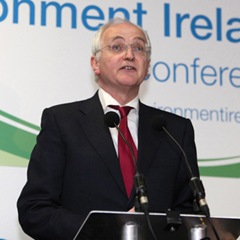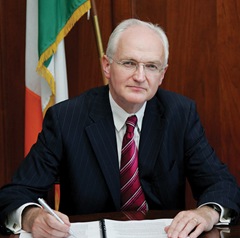A green message: John Gormley
 “The green economy is not about taxing more, it’s about taxing smarter and spending smarter,” Environment Minister John Gormley tells eolas.
“The green economy is not about taxing more, it’s about taxing smarter and spending smarter,” Environment Minister John Gormley tells eolas.
Ireland is taking its commitment to investing in the environment seriously and environmental policy is “innovative, ambitious and enthusiastic,” according to Environment Minister John Gormley.
However, “people can be quite lazy in the way they approach recycling,” especially during a recession when protecting the environment can be seen as an “abstract concept.”
Speaking to eolas, after addressing delegates at the sixth annual Environment Ireland conference, Gormley said that he “understands that people have different priorities” but he insisted that now is the time to ensure that the return to economic growth is transacted in an environmentally sustainable way. “In dealing with the economic downturn we must not fail to look beyond it … in terms of carbon intensity, resource efficiency and climate resilience,” Gormley warned.
“Too often, the message goes out that environmental issues means higher taxes and that’s not correct,” he told eolas. “We have to get rid of that perception.”
He added that the green message is getting through, particularly to children, and that families can do their bit by using the recession as an opportunity to move back to a more sustainable lifestyle. “People are eating a lot more homegrown food, they are baking a lot more and those things in themselves are quite sustainable,” he commented.
Policy
Looking at green economic policy to date, Gormley told delegates that the emissions-based motor tax regime introduced in December 2007, has resulted in an increase of low emissions vehicles which he claimed is “a win for the environment and consumers.”
The landfill levy increased from €25 to €30 on 1 February 2010 and the money collected from that has been used to ensure free recycling services so householders can reduce their bin charges, Gormley stated. It has also funded the Environmental Protection Agency’s ‘Science, Technology, Research and Innovation for the Environment’ (Strive) Programme.
Money gathered from the carbon levy, which originated in the revised October 2009 Programme for Government, is now being used to provide a grant scheme for home insulation and to fund the retrofitting of thousands of lower income homes. Gormley added: “I expect that the Government will announce changes to the fuel allowance regime for social welfare recipients to mitigate against the impacts of the carbon levy.”
The introduction of an environmental pillar to social partnership in April 2009 “complements” the focus on environmental sustainability in the National Development Programme, by allowing environmental NGOs to participate fully in social partnership, Gormley added.
The Climate Change Bill sets a target of at least 80 per cent reduction in net emissions (on 1990 levels) by 2050. Gormley admitted that drafting the heads of this bill – which will form the basis for the formal legal drafting – is taking “slightly longer” than expected.
Water
The exchequer has spent €4.6 billion on water infrastructure over the past decade and another €3.4 billion is “envisaged” over the next six years.
Following the “big freeze” last January, the Government will invest €320 million over the next three years for rehabilitation works aimed at reducing the rate of ‘unaccounted for water’. The findings of the annual report on service indicators for 2008 showed that over half of all water in seven out of the 34 local authorities went missing through leaks. Gormley conceded that the volume of water going missing is “generally high.”
Gormley’s Water Services Investment Programme is “the foundation for building on our green image in the tourism, agriculture, food processing, aquaculture and other business sectors,” he claimed.
Water meters are also on the way for over one million homes in an initiative that will take several years to complete, with bills expected to begin in 2012. He expects the project to create “significant employment opportunities” as well as generating a revenue stream to meet operational costs.
Instead of waste being seen as a problem, it should be seen as a resource, Gormley contends. Black bag waste should undergo mechanical biological treatment, which will create solid recovered fuel or refuse derived fuel that can then be used in either cement kilns or electricity generation.
His new draft statement on waste policy proposes an incineration waste levy be introduced to ensure that waste is sent to composting and recycling treatment facilities as a priority. Levies for other treatment facilities would be introduced in 2014. In addition, punitive fines would be placed on local authorities that do not prevent waste from going to landfill or incinerator sites.
Local authorities would also have to collect the waste themselves or tender the service to a professional body because local waste monopolies and poor waste services have become common.
Gormley’s department and Comhar (the sustainable development council) are currently preparing a draft National Sustainable Development Framework for Ireland, which will guide all departments and agencies.
A consultation on green public procurement is ongoing to ensure that green criteria is at the centre of all state procurement, including public-private partnerships. “We want to introduce green criteria so when you are ordering your bulbs for example they would be LED. Simple things like that can change direction,” Gormley explained.
The continued roll out of electric vehicles is another priority for the Minister. The target is to have 10 per cent of all vehicles to be powered by electricity by 2020.
At the moment there are “less than 100” electric vehicles in operation.
The Department of Energy Communications and Natural resources plans to introduce a grant scheme in January 2011 whereby those who purchase electric cars can avail of €5,000 and will be exempt from Vehicle Registration Tax. In addition, ESB has agreed to implement 3,500 electric charging points by December 2011 and Nissan and Renault will launch their electric vehicles at the beginning of 2011.
A DCENR spokeswoman told eolas: “By end 2012, there will eb a range of electric vehicles available, with most mainstream manufacturers having at elast one model available.”
There are currently 15 ‘domestic’ charge points in place throughout the country with a further16 in ESB premises and one at IDA headquarters.
“All relevant departments and agencies are working together to ensure that the necessary policies and infrastructure are in place to meet this target,” he added.
He finds it “very regrettable” that the Irish tax-payer has to pay €36 million in repatriating 250,000 tonnes of waste that was illegally dumped on 20 sites in Northern Ireland between 2002 and 2004.
“There was an awful lot of dumping going on, not jus
t cross border but in various parts of the country. We have legacy issues now that we are trying to deal with,” he said.
He added that he has “worked very hard” with his counterparts in Northern Ireland to ensure that it will never happen again.






